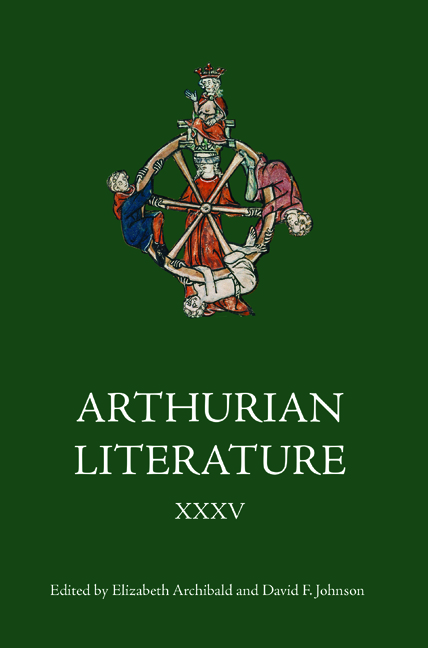Book contents
- Frontmatter
- Contents
- List of Illustrations
- General Editors’ Foreword
- List of Contributors
- I Arthurian Swords I: Gawain’s Sword and the Legend of Weland the Smith
- II Rex rebellis et vir pacificus: Civil War and Ecclesiastical Peacekeeping in the Vita Gildae of Caradog of Llancarfan
- III Once and Future History: Textual Borrowing in an Account of the First War of Scottish Independence
- IV ‘Me rewes sore’: Women’s Friendship, Affect and Loyalty in Ywain and Gawain
- V The Sacred and the Secular: Alchemical Transformation in The Turke and Sir Gawain
- VI ‘The native place of that great Arthur’: Foreignness and Nativity in Sixteenth-Century Defences of Arthur
- VII John Steinbeck’s ‘Wonder-Words’
- VIII The Once and Future King of Atlantis: The Arthurian Figure in Geoff Johns’s Aquaman: Death of a King
- IX Arthur and/or the Grail
- Miscellaneous Endmatter
IV - ‘Me rewes sore’: Women’s Friendship, Affect and Loyalty in Ywain and Gawain
Published online by Cambridge University Press: 11 September 2020
- Frontmatter
- Contents
- List of Illustrations
- General Editors’ Foreword
- List of Contributors
- I Arthurian Swords I: Gawain’s Sword and the Legend of Weland the Smith
- II Rex rebellis et vir pacificus: Civil War and Ecclesiastical Peacekeeping in the Vita Gildae of Caradog of Llancarfan
- III Once and Future History: Textual Borrowing in an Account of the First War of Scottish Independence
- IV ‘Me rewes sore’: Women’s Friendship, Affect and Loyalty in Ywain and Gawain
- V The Sacred and the Secular: Alchemical Transformation in The Turke and Sir Gawain
- VI ‘The native place of that great Arthur’: Foreignness and Nativity in Sixteenth-Century Defences of Arthur
- VII John Steinbeck’s ‘Wonder-Words’
- VIII The Once and Future King of Atlantis: The Arthurian Figure in Geoff Johns’s Aquaman: Death of a King
- IX Arthur and/or the Grail
- Miscellaneous Endmatter
Summary
The Middle English poem Ywain and Gawain, a fairly close adaptation of Chrétien de Troyes’ Yvain ou le chevalier au lion, has been relatively little studied compared to its source and compared to other Middle English Arthurian poetry. The few studies of the poem demonstrate that it raises important questions about adaptation, late medieval legal culture and gendered experiences of friendship. The poem depicts a variety of friendships, including those between men, between women, between men and women and between humans and animals, and many of these friendships intersect in complicated ways with the various types of obligation built into the social and political structures in which the narrative operates. Other Middle English Arthurian texts interrogate the relationship between gender and chivalric friendships primarily through the role of women in the homosocial world of Arthurian knights, but Ywain and Gawain does so differently, by juxtaposing the friendships between knights with the friendship between two women, the lady Alundyne and her advisor or lady-in-waiting Lunet. Public or political friendship is often coded as masculine in studies of the Middle Ages and later periods, while private or affective friendship is often coded as feminine and described as a development of later periods. But the friendship between Lunet and Alundyne is a political alliance at some moments in the text and a private affection at others; much of the poem's conflict comes from the points at which these two aspects to their friendship exist in tension with each other, even as the poem's male characters also negotiate between these two types of friendship. Ywain and Gawain therefore reveals that the interplay between gender, affective friendship and obligation in medieval romance is more complicated than it seems. By examining the complicated dynamics of the friendship between the poem's main female characters, including a manuscript image that reinforces the affective dimension of their central disagreement, we can better understand the anxiety about friendship that is central to Arthurian romance and how that anxiety is easily overlooked by theories of friendship that map gender onto a mind/body and public/ private dualism.
- Type
- Chapter
- Information
- Arthurian Literature XXXV , pp. 117 - 132Publisher: Boydell & BrewerPrint publication year: 2019



